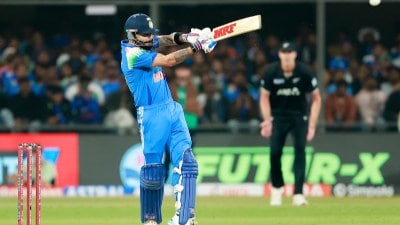Anytime, cell to cell, STD rates slashed
Cellphone companies today announced their first set of tariff reductions by slashing STD rates to a flat Rs 2.99 per minute for calls made t...

Cellphone companies today announced their first set of tariff reductions by slashing STD rates to a flat Rs 2.99 per minute for calls made to places at a distance of over 50 km, anytime of the day. At present these charges range between Rs 2.40 per minute and Rs 9 per minute in the peak hours. The rates will be applicable from midnight today for all calls made from cellphone to cellphone.
This is the first in a series of such concessions being planned for the coming weeks. The new rates will benefit those making calls to places more than 200 km away. All cell-to-cell calls will be charged a flat rate of Rs 2.99 per minute plus the airtime rate charged by its local operator. The charges for distance up to 50 km would remain unchanged at Rs 1.20 per minute.
So far, subscribers were being charged Rs 2.40 for calls up to a distance of 200 km, Rs 4.80 up to 500 km and Rs 9 beyond 500 km.
Interestingly, Communications Minister Pramod Mahajan decided to chair the press conference held for a simple rate reduction announcement by these private cellphone companies.
Some cellular operators themselves were surprised. 8216;8216;Normally ministers launch new services or rate cuts by public sector companies like Bharat Sanchar Nigam BSNL or MTNL over which they preside. Even we were surprised when we learnt that he would make the announcements on behalf of the industry,8217;8217; said a CEO of a leading cellphone company. Till yesterday no cellular operator knew that Mahajan would preside over the conference.
When asked whether there would be more such concession packages in the near future, Sunil Bharti Mittal, chairman of the Bharti Group owning the Airtel brand, said 8216;8216;yeh bakra kishton mein katega.8217;8217; This goat will be cut in instalments.
In a smart repartee, Mahajan said 8216;8216;they cellular operators will kill their rivals in instalments,8217;8217; in an obvious reference to the cellphone companies8217; bid to match the low rates announced by Reliance on their proposed CDMA mobile service expected to hit the market next month.
8216;8216;Now nobody has to wait for the night to make STD calls. It is death of both distance and time,8217;8217; the Minister said.
Ironically, though Mahajan announced the STD rate slash by cellphone companies, he refused to speculate what this would mean in terms of revenue loss for public sector BSNL which has the major share of the long-distance traffic. Experts say that these losses could run into Rs 2,000 crore as BSNL would now be forced to match these rates to protect its market.
So far, BSNL subsidises local call rates and rentals for its fixed lines from revenue earned in long distance; now this cover will not be available. But increasing landline phone call rates, especially for the one crore rural phones, is normally a sensitive political decision.
Since such a move will be opposed quite fiercely, BSNL will have to bear the brunt of these decisions and be pushed into the red from being a profit-making company.
Earlier, in his opening remarks, Cellular Operators Association of India COAI Director General T V Ramachandran said the operators would take aggressive action to hold on to their market share. He also said that the Government or the regulator would have to address the problem of differential access charges being levied on cellular subscribers.
- 01
- 02
- 03
- 04
- 05






























